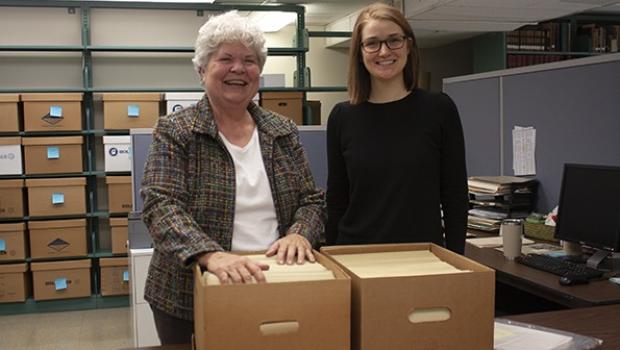Records Basics

--by Yvonne Wathen, Records Manager at the Presbyterian Historical Society
When we feel we’ve lost our way in sports, in our career, in life, we oftentimes go "back to the basics" to find our footing so we can then move forward again. As Michael Jordan said, “The minute you get away from fundamentals--whether it's proper technique, work ethic, or mental preparation--the bottom can fall out of your game, your schoolwork, your job, whatever you’re doing.” Keeping this in mind, let’s start at the basics of record keeping, for it’s the only way to successfully manage an important part of your history.
Identifying a record
First things first. You must know if the paper, Word document, e-mail, or photograph you have in front of you is defined as a record or a non-record. According to the online Business Dictionary, a record is defined as a document that memorializes and provides objective evidence of activities performed, events occurred, results achieved, or statements made. Records are created or received by an organization in routine transaction of its business or in pursuance of its legal obligations. A record may consist of two or more documents. Note that there is no mention of the type of media for a record. Records can be books, drawings, disks, thumb drives, e-mails, photographs, faxes, web sites, and so forth. If the item in front of you does not fall into the definition of a record above, then it is a non-record.

A retention schedule
So now you know you have a record. How long do you need to keep it? The answer depends on the local, state, and federal laws applicable to that record and the business need. At times, records are well-regulated, as in the case of financial records. At other times there are no laws stating how long to retain a record. Armed with the knowledge of the laws pertaining to each record and the needs of your church or other entity, you can determine how long to keep each record.
This is the work that goes into creating a retention schedule. Luckily for you, the work has already been done by the Presbyterian Historical Society; access the retention schedules for use by mid councils and congregations by clicking here and scrolling down the page. Each retention schedule is organized by retention time period, so look at the whole list when searching for a specific type of record.
Where should I keep the records?
Last but certainly not least, the records must be stored somewhere. The key to storing records is knowing what is stored where. Without this knowledge, the stored records are useless.
With the organization in place, environmental conditions are to be considered. Ensure nothing is stored directly on the floor to help prevent water damage. Short term records can be stored in an environment reasonable for humans. Historical records need special environmental conditions to preserve them as long as possible. These conditions include a temperature between 65 and 75 degrees Fahrenheit and relative humidity between 35% and 50%. Another factor to consider is light. As little light as possible is recommended, including sunlight. These guidelines will help you preserve for your historical records.

For electronic records, storing on hard drives is fine. Just keep in mind that the longer you store electronic records, the more of a need to migrate to newer versions of software you will encounter; even Word documents will need to be migrated to the newest version. Generally, about every 5 years would be a good time to migrate files to versions of new software.
We have covered the basics--what is a record, how long to keep it, and where to keep it. This information, including the retention schedules available on the website of the Presbyterian Historical Society, should be enough to get you started on the road to managing your records. For additional questions, please feel free to contact me, Yvonne Wathen, Certified Records Manager, at Yvonne.wathen@pcusa.org or 502-569-5246.





















